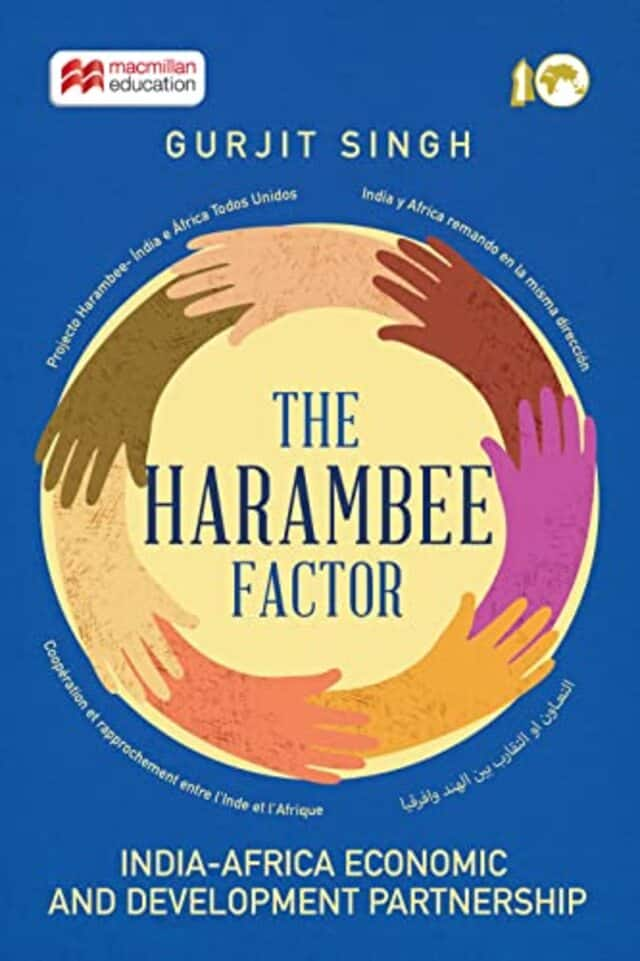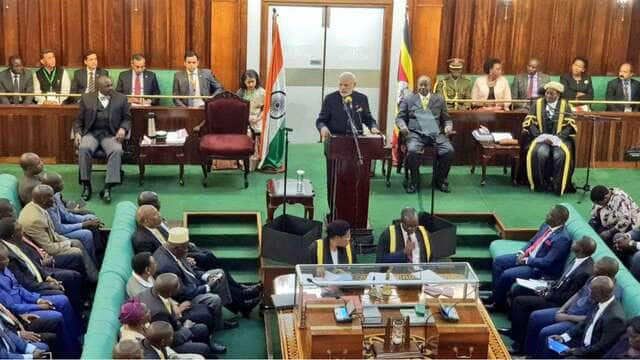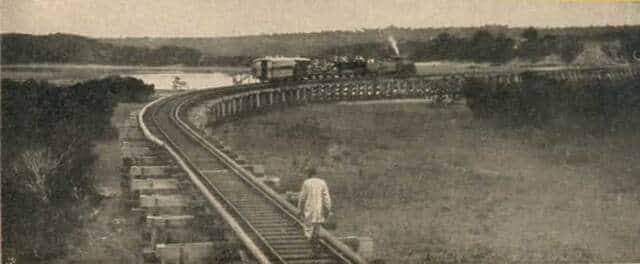Once seen as bywords for poverty and civil strife besides famine and corruption, Africa has emerged as a new growth pole of the world, with its capacity for consumption (given the growth of a middle class) as well as absorbing capital, says a new book on India-Africa economic ties. Written by Gurjit Singh, a former Indian ambassador to Ethiopia, Indonesia and Germany, the book, Harambee Factor: India-Africa Economic and Development Partnership, offers a rare deep dive into India-Africa economic and development partnership prospects. The author very early notes that “the twenty-first century, labelled as the Asian century, is now also becoming an African century.” [caption id=“attachment_10731811” align=“alignnone” width=“640”]  Harambee Factor: India-Africa Economic and Development Partnership. Amazon. in[/caption] “This requires closer attention to what Africa provides and brings to the table in a larger global context,” Singh says in the 500-page book published by Macmillan. It fills a particularly critical information gap about India’s economic engagement with Africa. The focus is on India’s cooperation with Africa and does not meander into China’s engagement with Africa. “Over the past 15 years, Africa’s GDP has tripled, making it the world’s second fastest growing region with an annual average of 4.6 per cent, behind Asia (7.2 per cent). Following a slowdown in 2016, Africa’s growth is bouncing back, and was expected to reach 4 percent annually by 2020, before the outbreak of the COVID-19 pandemic. Consumption growth was expected to drive this process led by population growth, urbanisation and the purchasing power of an emerging African middle class,” Singh writes. “For the first time in more than a decade, growth in Africa is largely due to expansion of investments rather than consumption, as well as from exports. FDI into Africa rose by 11 per cent in 2019, compared to 4 per cent in Asia, while it declined 13 per cent globally and by 23 per cent in developed economies,” Singh says. It is against this backdrop of sweeping changes in Africa — once seen as riddled by poverty and instability — that Singh examines the twists and turns of India’s own relationship with the continent. The narrative is interestingly woven with anecdotes that ensures the reader’s attention isn’t snapped. Once united in their fight against apartheid and colonialism, India began looking anew at Africa from the beginning of the 21th century and Singh traces the transformation of ties from the year 2000 to the present through the three India-Africa Summits that have been held in 2008, 2011 and 2015 and other events in between. India’s early government-run Indian Technical and Economic Cooperation programme that trains people from Africa (and other countries) to the lesser known Industrial Services Training Programme (ISTP) run by the Confederation of Indian Industry and the Ministry of External Affairs find mention in a chapter aptly titled “We, the People” that chronicles all the skill development programmes for Africa over the ages. The evolution of India’s government-to-government loans to Lines of Credit (LoC) that were extended to Africa from the mid-2000s onwards formed the basis of the economic engagement with Africa at this time. The LoCs helped to build infrastructure as well as promote Indian exports besides helping showcase Indian project implementation skills. From 2004 to 2020, “nearly 200 LoCs were extended to African countries for about $12 billion,” Singh notes, adding that the “LoCs became the mainstay of the new wave of economic engagement… (it became) a new paradigm of expansion for the Indian economic imprint in Africa. In particular, this supported the objectives of capacity-building, transfer of technology, trade and infrastructure development.” “The LoCs manifested India’s commitment to assist African countries with substantive concessional credit support to achieve their development goals,” he writes. Other markers of India’s commitment to Africa include the 10 points outlined by Prime Minister Narendra Modi in a speech to the Ugandan parliament in 2018, the increasing frequency of high level visits to Africa at the presidential, vice presidential as well as ministerial levels. Then there are the 18 new missions that India has opened in Africa between 2018 and 2022 that takes the number of Indian resident missions in Africa from 29 to 47. [caption id=“attachment_10731861” align=“alignnone” width=“640”]  PM Modi addressing Parliament of Uganda in July 2018. Twitter/@MEAIndia[/caption] Given Africa’s emergence as a growth pole, Singh advocates that India should change tack from extending LoCs and look at increasing investments in Africa. This is something that needs to be looked at by the Indian private sector. Given that Africa is looking at coalescing into a large free trade area, Indian businesses would do well to invest in Africa and take advantage of the regional as well as continental trading arrangements that will be in place soon. Already India is Africa’s fourth largest trading partner with bilateral trade in 2018-19 standing at almost $70 billion. A word about the title of the book. The word “Harambee” comes from Swahili spoken commonly in East Africa (particularly in the Great Lakes region). It means “pulling together in a cooperative spirit” explains Singh in the preface to the book. The allusion could be to India and Africa marching in tandem, taking cooperative steps forward. Singh also tantalisingly points to a possible Indian connect to the word “Harambee”. “The Indians who laid the original Mombasa Kisumu railway often used the terms for ‘Hari’ and ‘Ambe’ together as ‘Har-ambe’ when picking heavy loads or rail tracks. ‘Hari’ referred to the Lord Vishnu and ‘Ambe’ to the Goddess Shakti. This pronunciation of ‘Harambe’ was adapted by their co-workers to become ‘harambee’ and then absorbed into Swahili,” Singh writes, pointing to another possible connect between India and Africa. [caption id=“attachment_10731921” align=“alignnone” width=“640”]  Uganda Railway, the curve near Mombasa, in 1899. Wikimedia Commons/jaduland.de[/caption] Elizabeth Roche is currently Associate Professor - Practice, at Jindal School of International Affairs, Jindal Global University. She was previously Foreign Editor-Mint. Read all the Latest News , Trending News , Cricket News , Bollywood News , India News and Entertainment News here. Follow us on Facebook, Twitter and Instagram.
Written by Gurjit Singh, a former Indian ambassador to Ethiopia, Indonesia and Germany, ‘Harambee Factor’ offers a rare deep dive into India-Africa economic and development partnership prospects
Advertisement
End of Article


)

)
)
)
)
)
)
)
)



